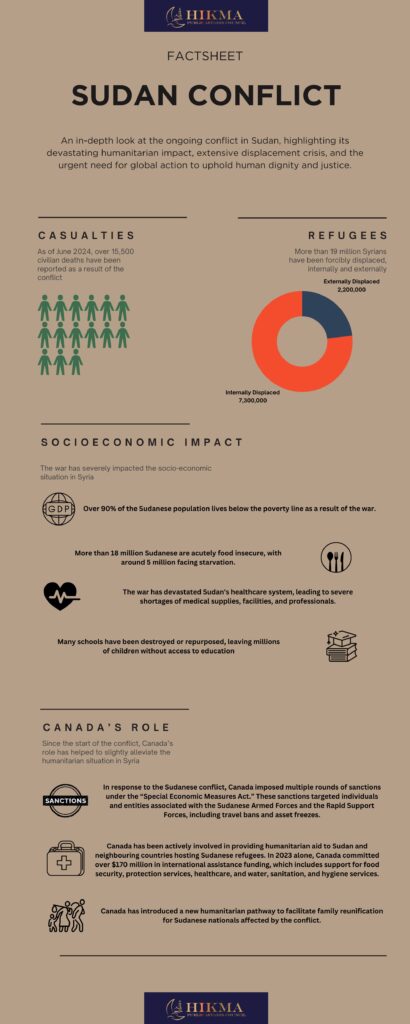The Conflict in Sudan: A Humanitarian Crisis
The conflict in Sudan has resulted in thousands of civilian deaths and millions of people displaced. The violence has severely damaged the country’s infrastructure, worsened poverty, and led to dire humanitarian crises, with widespread food insecurity and limited access to healthcare. Despite international efforts to broker peace, Sudan remains plagued by instability and suffering, with recent clashes between military factions further complicating the situation.
Background
In 2019, Omar Al-Bashir, longtime military dictator of Sudan, was deposed after an uprising. Following the ousting of the transitional government, General El Burhan of the armed forces seized power along with Mohamed Hamdan Daglo (Hemedti), the leader of the Rapid Support Forces (RSF), a paramilitary group that operated with government support since 2003. Conflict broke out between the RSF and the armed forces in Khartoum and spread across Sudan, exacerbating pre-existing health and food crises. The situation has become more dire, with both sides committing war crimes, including the targeting of civilians, and reports of sexual crimes.
The Current Situation in Sudan
According to UN estimates, 8.8 million people have fled their homes since mid-April 2024. Rising levels of acute hunger and malnutrition are expected to cause increased levels of mortality in the coming months. In 2024, 24.8 million people are in need of assistance. 7.1 million are internally displaced, and 2 million people have crossed a border as of April 15th.
Canadian Response
Canada has taken a multifaceted approach in response to the conflict in Sudan. This includes imposing sanctions on key individuals and entities linked to the Sudanese Armed Forces and the Rapid Support Forces to undermine their capacity to continue the conflict. These sanctions align with measures taken by other international partners such as the United States, the European Union, and the United Kingdom.
In addition to sanctions, Canada has committed significant humanitarian assistance, providing over $170 million in 2023 to support emergency health services, food and nutrition aid, protection services for survivors of gender-based violence, and other essential needs. This funding is directed through experienced humanitarian partners working in Sudan and neighbouring countries affected by the crisis. Canada has also introduced a new humanitarian pathway to facilitate family reunification for Sudanese nationals affected by the conflict.
While these efforts are commendable, they do not address the root causes of the conflict in Sudan. The aid provided offers temporary relief for communities facing dire straits. The best response is to collaborate with global and regional partners to provide an effective and safe asylum program to effectively evacuate civilians from the ongoing conflict.
Contribution by Youssef Shaarawi, Hikma Intern

